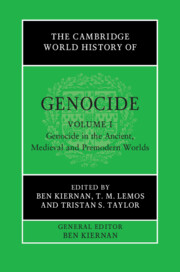Book contents
- The Cambridge World History of Genocide
- The Cambridge World History of Genocide
- The Cambridge World History of Genocide
- Copyright page
- Contents
- Figures
- Maps
- Tables
- Contributors to Volume I
- General Editor’s Acknowledgements
- General Editor’s Introduction to the Series
- Introduction to Volume I
- Part I Themes of Genocide through History
- 1 Genocide before the State?
- 2 The Religion–Genocide Nexus
- 3 Genocide and Gender
- 4 Genocide, Starvation and Famine
- 5 Climate, Violence and Ethnic Conflict in the Ancient World
- Part II The Ancient World
- Part III The Medieval World and Early Imperial Expansions
- Index
1 - Genocide before the State?
from Part I - Themes of Genocide through History
Published online by Cambridge University Press: 23 June 2023
- The Cambridge World History of Genocide
- The Cambridge World History of Genocide
- The Cambridge World History of Genocide
- Copyright page
- Contents
- Figures
- Maps
- Tables
- Contributors to Volume I
- General Editor’s Acknowledgements
- General Editor’s Introduction to the Series
- Introduction to Volume I
- Part I Themes of Genocide through History
- 1 Genocide before the State?
- 2 The Religion–Genocide Nexus
- 3 Genocide and Gender
- 4 Genocide, Starvation and Famine
- 5 Climate, Violence and Ethnic Conflict in the Ancient World
- Part II The Ancient World
- Part III The Medieval World and Early Imperial Expansions
- Index
Summary
Did genocide exist in prehistory before the formation of states? With Europe as focus, this article seeks an answer to this seminal question by coupling three lines of archaeological evidence: warfare, abnormal graves and genetics. When warfare is waged against other groups, there is a risk of genocidal events of unconstrained violence. Warfare became more frequent when Neolithic farmers, and later pastoral herders, migrated into the land in several expansions that eventually absorbed or replaced original residents. In the Bronze Age, along with professional military units and higher population densities, abnormal graves increased significantly in frequency. Indeed, warfare is often in evidence in abnormal graves, which call to mind recent examples of genocidal massacres and mass graves. At times, however, there is no apparent reason for the deviant interment. The victims in these graves evidently shared some form of identity. Young women and adolescents are often in minority, probably because they were taken captives and incorporated in the captors’ society as wives and labourers. The conclusion is that genocidal moments took place. Genetic and archaeological evidence corroborates that exposed groups’ possibility to continue reproducing themselves economically, culturally and biologically became restricted. Epidemics is an unknown variable.
- Type
- Chapter
- Information
- The Cambridge World History of Genocide , pp. 59 - 85Publisher: Cambridge University PressPrint publication year: 2023



